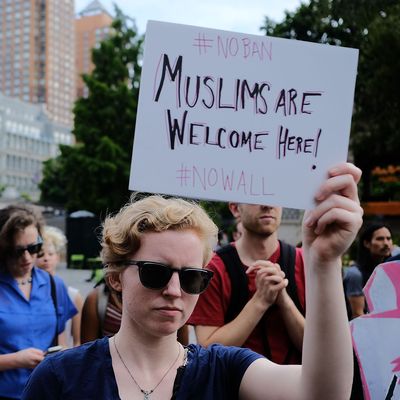
As of 8 p.m. ET on Thursday night, President Trump was finally allowed to reenact his travel ban and continue pursuing his goal of providing “additional scrutiny” to people from six Muslim-majority nations because “the conditions in these countries present heightened threats,” as stated in his March executive order. Or rather, Trump was allowed to enact a heavily modified version of the March directive, which itself was a watered-down version of a January executive order.
Though Trump’s campaign-trail promise for a “total and complete shutdown” of Muslims entering the U.S. keeps getting less and less drastic, people were still riled by the ban on certain visitors from Libya, Syria, Iran, Somalia, Yemen, and Sudan for the next 90 days, and most refugees for 120 days. One particular point of contention was the administration’s seemingly arbitrary rules on who counts as a sufficiently “close” family member. The guidelines issued by the State Department on Wednesday state:
“Close family” is defined as a parent (including
parent-in-law), spouse, child, adult son or daughter, son-in-law,
daughter-in-law, sibling, whether whole or half. This includes step
relationships. “Close family” does not include grandparents,
grandchildren, aunts, uncles, nieces, nephews, cousins, brothers-laws and
sisters-in-law, fiancés, and any other “extended” family members.
State Department spokeswoman Heather Nauert defended the new rules on Thursday, saying they assure Americans that they won’t be harmed by foreigners entering the country.
“The American public could have legitimate concerns about their safety when we open our doors,” she said, “and we open our doors to people who go through proper screening measures and who want to be here and be productive members of society.”
But there’s bad news for those Americans who slept a little easier on Thursday night thinking that they were no longer under threat from Iranian fiancés. A short time after the ban went into effect, the betrothed were moved to the “yes” list. “Upon further review, fiancé will now be included as close family members,” a State Department official said in a statement. They did not explain how they came to the last-minute realization that fiancés aren’t a top safety concern.
The Supreme Court put the Trump administration in the awkward position of grading familial relationships when it ruled on Monday that the travel ban could be partially enacted while we await the court’s final ruling in the fall. However, the justices said the injunctions put in place by lower courts would only be lifted for “foreign nationals who lack any bona fide relationship with a person or entity in the United States.”
Trump administration officials said they took their definition of close family members from the Immigration and Nationality Act of 1965. But they acknowledged that they added some relations that aren’t included in the statue, like in-laws. Why? Because one of the plaintiffs in the case that led to a federal judge in Hawaii blocking the travel ban wants his Syrian mother-in-law to be able to visit. In Monday’s ruling, the Supreme Court specifically said that she counts as a foreigner who has a “bona fide relationship” with an American.
Late on Thursday, the state of Hawaii filed an emergency motion asking the same judge who blocked the travel ban in March to issue an order clarifying that the Trump administration can’t proclaim that relatives such as grandparents, aunts, and uncles don’t count as “bona fide” relations.
“The Government does not have discretion to ignore the Court’s injunction as it sees fit,” the motion said. “The State of Hawaii is entitled to the enforcement of the injunction that it has successfully defended, in large part, up to the Supreme Court — one that protects the State’s residents and their loved ones from an illegal and unconstitutional Executive Order.”
Another rule that’s expected to generate legal action is the Trump administration’s claim that refugees who have longstanding ties to refugee placement agencies in the U.S. do not have a “bona fide relationship” with a “U.S. entity” — despite the fact that the Supreme Court said something as flimsy as an invitation to speak at a U.S. university should allow a foreigner to bypass the travel ban.
“The U.S. government is once again unfairly changing the rules on refugees who, after fleeing for their lives, are now struggling to eat and to stay alive while they try to follow those rules,” Mark Hetfield, president and chief executive of the resettlement agency HIAS told the New York Times.
Despite these concerns, compared to the massive airport protests sparked by the original ban, the reaction on Thursday was muted. Hundreds protested in New York’s Union Square, but airports across the country only drew immigration attorneys offering free legal advice, and a smattering of demonstrators.






























